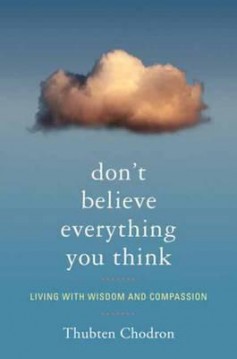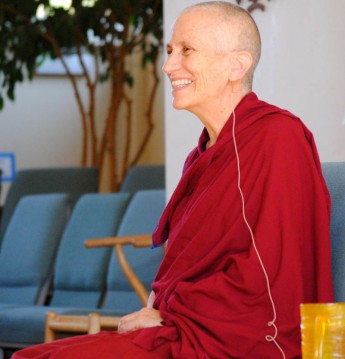
NEWPORT — As the bhikshunis, guests and residents at Sravasti Abbey finish their warm, vegetarian lunch, a bell rings and together they begin chanting the 37 Practices of Bodhisattvas.
“Having gained this rare ship of freedom and fortune, hear, think, and meditate unwaveringly night and day in order to free yourself and others from the ocean of cyclic existence — this is a practice of bodhisattvas,” they begin. “Attached to your loved ones you're stirred up like water. Hating your enemies, you burn like fire. In the darkness of confusion you forget what to adopt and discard. Give up your homeland — this is the practiced the bodhisattvas.”
The chant is rapid.
Venerable Thubten Chodron, founder of the abbey, and the other bhikshunis know each verse by heart. Others read them off a laminated sheet.
The 37 practices have been recited by Tibetan Buddhists since the 14th century, when a monk named Tomay Zangpo composed them.
In Chodron’s newest book, “Don’t Believe Everything You Think: Living with Wisdom and Compassion,” she explains the practices and includes stories from her students, many from the Spokane area, who have been impacted by the verses.
The book, she explained, though based on ancient Buddhist teachings, is designed to help people of all faith backgrounds transform their minds and have a more beneficial and realistic view of the world.
“I think we’d have a different society (if everyone read this). I think personally people would be happier, they’d have better relationships with other people, the crime rate would be way down, drug use would be way down, and alcohol use. We wouldn’t have so many kids and teens running away, parents who are drug addicts, or so many divorces,” Chodron said.
She explained that a bodhisattvas (pronounced boh-dee-SAHT-vah) is a person aspiring to fully cleanse all the negative in their mind and develop good qualities for the benefit of all living beings. In her book, which was published by Snow Lion and released Jan. 1, she writes that no one knows who is or isn’t a bodhisattva, so everyone should be treated like one.
The key to becoming a bodhisattva, Chodron said, is in the title of the book — not believing everything you think.

“The interpretations of what we encounter in life are often skewed…we believe our interpretations and we act on them and we get into trouble,” she explained.
By meditating on the 37 practices and learning them, Chodron said one can recall past situations and realize, “the old perception was made up by a distorted mind.”
“It’s a fantastic way to resolve psychological issues you’ve had over the years,” she said. “By training your mind repeatedly you learn new ways to see things.”
Isaac Estrada, who has studied the practices through the abbey, said verse 36 made one of the strongest impacts on him.
“In brief, whatever you were doing, ask yourself, “What’s the state of my mind?” With constant mindfulness and introspective awareness accomplish other’s goods — This is a practice the bodhisattvas.”
He said being aware that the state of your own mind can bring suffering to others is a powerful reminder to always be mindful.
Chodron said the best way to practices the verses is to pick one, meditate on it, and reflect on how it can be applied to a situation in your life.
Her next book, co-authored with Eastern Washington University Professor Dr. Russell Koltz, will focus on scientific and spiritual components of compassion. It’s expected to be released in the next year.







